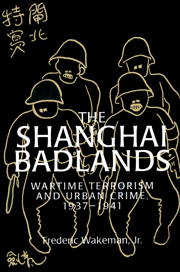Book contents
- Frontmatter
- Contents
- Dedication
- Acknowledgments
- Glossary
- Shanghai, 1940
- Metropolitan Shanghai
- Dedication
- Prologue: Consequences
- 1 Island Shanghai
- 2 Blue Shirts
- 3 National salvation
- 4 Retaliation: Pro-Japanese terrorism
- 5 Provocation: The Chen Lu assassination
- 6 Capitulation: The Xi Shitai assassination
- 7 The puppet police and 76 Jessfield Road
- 8 Terrorism and crime
- 9 Rackets
- 10 Terrorist wars
- 11 Dimout
- Epilogue: Outcomes
- Abbreviations
- Notes
- Bibliography
- Index
4 - Retaliation: Pro-Japanese terrorism
Published online by Cambridge University Press: 02 November 2009
- Frontmatter
- Contents
- Dedication
- Acknowledgments
- Glossary
- Shanghai, 1940
- Metropolitan Shanghai
- Dedication
- Prologue: Consequences
- 1 Island Shanghai
- 2 Blue Shirts
- 3 National salvation
- 4 Retaliation: Pro-Japanese terrorism
- 5 Provocation: The Chen Lu assassination
- 6 Capitulation: The Xi Shitai assassination
- 7 The puppet police and 76 Jessfield Road
- 8 Terrorism and crime
- 9 Rackets
- 10 Terrorist wars
- 11 Dimout
- Epilogue: Outcomes
- Abbreviations
- Notes
- Bibliography
- Index
Summary
There were two major pro-Japanese societies active in Shanghai at this time, both founded around January 1938. The more respectable of the two was the China Rehabilitation and Public Welfare Society (Zhongguo fuxing gongyi hui), the stated aims of which were to accelerate the movement to restore peace between China and Japan, to establish a new order in the Orient, and to bring about the rehabilitation and public welfare of the Chinese. Whereas the Rehabilitation Society was generally directed toward propaganda work, especially in newspaper circles, the second major pro-Japanese group, the Chinese Imperial/Yellow Way Society (Zhonghua huang/huang daohui), was devoted to “special work” and terrorism.
The Rehabilitation and Yellow Way Societies
The Rehabilitation Society was subsidized by the Japanese military headquarters and controlled by a Japanese agent named Kimura. The society's puppet chairman, Liu Song, and puppet vice-chairman were each paid $500 per month; and the chiefs of its five departments (secretariat, special services, general affairs, social affairs, economic rehabilitation) were each paid $360. Since members were given up to $180 apiece, and there were additional expenses for servants, rent, gasoline, and so forth, the total monthly subsidy was $23,000
The regulations for the society were drafted by a somewhat shady character named Yang Kya-chu [Yang Jiachu]. Yang, who was known to everyone as “Colonel Walter Yang” had gone to work for a U.S. law firm after graduating from St. John's University. Accused of embezzlement, he was caught trying to set fire to the office and its records, and had served a term in the Ward Road jail before becoming Manchurian warlord Zhang Zuolin's English interpreter.
- Type
- Chapter
- Information
- The Shanghai BadlandsWartime Terrorism and Urban Crime, 1937–1941, pp. 43 - 52Publisher: Cambridge University PressPrint publication year: 1996
- 1
- Cited by

